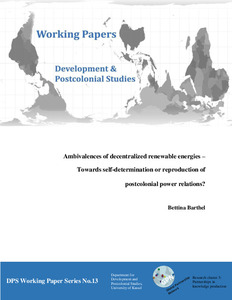Ambivalences of decentralized renewable energies – Towards self-determination or reproduction of postcolonial power relations?
| dc.date.accessioned | 2023-11-29T09:39:13Z | |
| dc.date.available | 2023-11-29T09:39:13Z | |
| dc.date.issued | 2023-06 | |
| dc.identifier | doi:10.17170/kobra-202311249087 | |
| dc.identifier.uri | http://hdl.handle.net/123456789/15234 | |
| dc.language.iso | eng | |
| dc.rights | Namensnennung - Weitergabe unter gleichen Bedingungen 4.0 International | * |
| dc.rights.uri | http://creativecommons.org/licenses/by-sa/4.0/ | * |
| dc.subject | decentralisation | eng |
| dc.subject | renewable energies | eng |
| dc.subject | development partnerships | eng |
| dc.subject | postcolonial development research | eng |
| dc.subject | postcolonial science and technology studies | eng |
| dc.subject | energy anthropology | eng |
| dc.subject.ddc | 300 | |
| dc.title | Ambivalences of decentralized renewable energies – Towards self-determination or reproduction of postcolonial power relations? | eng |
| dc.type | Working paper | |
| dcterms.abstract | The United Nations proclaimed the years between 2014 and 2024 to be the Decade of Sustainable Energy for All, and the SDG 7 emphasizes the necessity of universal energy access. Development policies increasingly see decentralised supply structures as a viable solution to achieve that goal. From a postcolonial perspective however, it is also relevant whether renewable decentralized en- ergies enable more local control and reduce dependency relations. Technology critics in the ‘70s and ‘80s saw this potential. In the field of energy and development, various debates and under- standings of decentralization converge. First the paper traces back the theoretical debates and policies of decentralisation. Secondly it examines two current case studies of German-Tanzanian partnerships of technology development, domestic biogas and solar home systems. As a result, both case studies can be described as decentralized structures with regard to some aspects, and as cen- tralized structures with regard to others. The paper shows that decentralized renewable energies do not automatically lead to the reduction of dependency relations or a socially just implementa- tion. It aims to sensitize against such underlying assumptions or narratives, because they can im- pede a more accurate and critical view on decentralized renewable energy projects. | eng |
| dcterms.accessRights | open access | |
| dcterms.creator | Barthel, Bettina | |
| dcterms.extent | 64 Seiten | |
| dc.contributor.corporatename | Kassel, Universität Kassel, Fachbereich Gesellschaftswissenschaften | ger |
| dc.subject.swd | Erneuerbare Energien | ger |
| dc.subject.swd | Dezentralisation | ger |
| dc.subject.swd | Postkolonialismus | ger |
| dc.type.version | publishedVersion | |
| dcterms.source.series | DPS Working Paper Series | eng |
| dcterms.source.volume | No. 13/2023 | |
| kup.iskup | false |
Dateien zu dieser Ressource
Das Dokument erscheint in:
-
DPS Working Paper [17]


